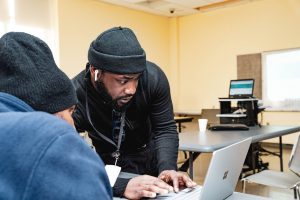
Related Stories
Digital Equity Champions for All Learners: Queens Library Digital Connect Program Supports Individuals Who Were Previously Incarcerated
The Queens Public Library in New York City is closing the digital divide for individuals who were previously incarcerated through its Digital Connect program. During COVID-19, the library observed a critical need for these patrons to have access to technology and digital skill-building opportunities. According to Jill Anderson, assistant director of jail, prison, reentry, and youth justice services, “[P]risons and jails are not technological places, [therefore] just by being in a prison or in jail, you’ve missed out on…working with technology. And so… [our patrons who were previously incarcerated] don’t have that foundation.”
The Digital Connect Program provides individuals who were previously incarcerated with free access to a mobile device and data service. According to Anderson, the decision to provide participants with a mobile device was intentional and necessary due to its lower barrier to entry and flexibility of use. She added, “A fair amount of the people we work with are not in stable housing…so we didn’t want to have something big with all these cords.” The program also equips participants with digital literacy skills, requiring participants to complete at least five in-person digital literacy courses designed to accommodate a range of topics and levels of understanding, from turning on the computer and simple interfacing to navigating common applications.
Since 2020, Queens Public Library has observed the impact of their program, including a lower rate of re-incarceration than people released in New York generally and participants using their newly acquired digital skills. One program participant provided this testimonial: “This program and the instructors were great at listening and walking students through the program step-by-step…Technology is very difficult to grasp for people coming home from serving long-term sentences.”
The Digital Connect Program was initially designed to pair program participants with a “Technology Navigator” with whom they would meet weekly to learn digital literacy skills and navigate technology challenges. Anderson quickly learned the Technology Navigators also assisted participants with basic needs, including food, housing, transportation, and identification documents. As the program developed, the one-on-one digital skills support transitioned to full digital literacy classes, more instructors were hired, and the navigators shifted toward supporting access to basic needs for participants.
Anderson also recognized the importance of Technology Navigators being able to understand clients’ needs and treat them with compassion. “Training your staff on meeting people where they are… so that [they]’re not upset when someone comes in late or misses an appointment … or when [they] can’t get in touch with someone . All those things are realities of working with the public, but especially…[when]working with [this population].” Anderson additionally shared how she considers this in the Technology Navigator hiring process, “I have found that tech skills can be taught but having an attitude of…wanting to help someone… that is a lot harder to teach.”
Anderson further emphasized the importance of being adaptive, “Between each cohort we’ve made little changes…and that’s really been helpful. For example, the program will change some course locations to improve attendance rates, as the program welcomes its newest cohort in April 2023.”
Based on her experience with the Digital Connect program, Anderson shared a few lessons for leaders looking to serve their communities using a similar model:
- Provide digital tools and skills training relevant to the interests and needs of the community.
- Keep manageable caseloads for navigators.
- Connect with private sector partners willing to provide devices and services at a low cost.
- Train staff on how to serve clients with compassion, understanding, and empathy.


